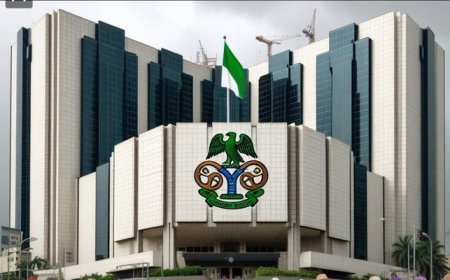EFCC Makes History: Abuja Estate With 753 Homes Forfeited to Nigerian Government
EFCC, Asset Forfeiture, Abuja Estate, Anti-Corruption, Real Estate Fraud, Nigeria News, Justice Onwuegbuzie, Public Wealth Recovery


EFCC Recovers Abuja Estate with 753 Homes: The Biggest Asset Seizure in Its History
What Happened?
In December 2024, Nigeria’s top anti-corruption agency the Economic and Financial Crimes Commission (EFCC) - achieved its biggest property recovery since it was founded in 2003.
A judge in Abuja, Justice Jude Onwuegbuzie, ruled that a massive housing estate must be handed over (forfeited) to the Federal Government of Nigeria. This wasn’t just any estate — it contained 753 buildings, including duplexes and apartments, all spread over 150,500 square meters of land.
To picture how big that is: it's more than 20 football fields put together. {i know right...massive!}
Now, that you have gotten a glimpse of what happened, lets check out what the term "asset recovery" is
What Is "Asset Recovery"?
When someone steals public money or earns wealth illegally; for example, through fraud, bribery, or money laundering, they often use it to buy land, houses, cars, or invest in businesses.
Asset recovery is when the government, through bodies like the EFCC, investigates such cases and, if found guilty or suspicious, takes back those properties so that they can no longer be enjoyed by corrupt individuals.
Why Is This Particular Case Important?
This estate is the largest property the EFCC has ever recovered in 21 years.
753 homes is not a small number. That’s enough to house thousands of people.
The land value alone, located in Abuja (Nigeria’s capital), is worth billions of naira.
The court’s decision shows that even high-level, hidden crimes can be uncovered.
According to the EFCC, this kind of large-scale seizure sends a strong message to those who use stolen money to quietly invest in properties. It tells them, “You can’t hide!.” atleast not for long.
What Happens to the Property Now?
Since the estate now belongs to the Federal Government, it can be used for public good. Here’s what might happen:
- It could be turned into affordable housing for citizens.
- It might be sold, and the money sent to national development projects.
- It could be given to government agencies for use.
The goal is to make sure that what was once stolen now serves the people.
Why Did the Court Forfeit It?
Although full details haven’t been made public, the judge was convinced...based on evidence provided by the EFCC -- that the estate was linked to corrupt practices.
Usually, in such cases:
Investigators trace how the land was bought.
They look into who paid for construction, and whether those funds were clean or stolen.
If it’s found that illegal money (for example, stolen from government contracts or public offices) was used, the court can order the property to be forfeited.
What Did the EFCC Say?
The EFCC celebrated this as a milestone in Nigeria’s fight against corruption. Their chairman, Ola Olukoyede, emphasized that they’re not only after small criminals, but also those involved in economic sabotage --

crimes that affect the entire country’s progress.
They’ve promised to continue recovering assets, especially in real estate, where much of Nigeria’s stolen wealth ends up being hidden.
Why Should Nigerians Care?
When large properties like this are recovered:
- It shows that corruption is being tackled{ no matter how slow it may seem}
- It brings hope that public money can be returned and can be used wisely.
- It sets an example for the future: if you steal, you’ll lose everything.
And most importantly, it helps Nigeria get back resources that belong to the people, not just a few powerful individuals.{Mitigating political pyramid schemes}
- The Need For Private Investigators To Review AMCON'S Operations Over The Last Decade
- How Non Payment Of Your Debt Affect Your Integrity
- Strengthening Fight Against Financial Fraud in Nigeria
- Understanding The Dangers of Financial Fraud And How To Stay Clean
Final Thoughts on this
This case is more than just real estate; it's a symbol of justice, accountability, and progress. For years, powerful people in Nigeria have used their influence to steal and hide wealth, especially by investing in big properties. But the EFCC’s success here shows that no one is too big to be investigated, and that the law can work for the people. As citizens, staying informed and supporting these efforts matters-- because when corruption is punished, everyone benefits!.
Thank you for reading thus far; kindly like, share, and comment
What's Your Reaction?






































































































